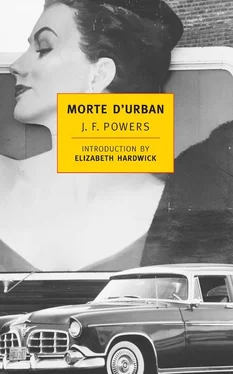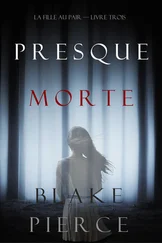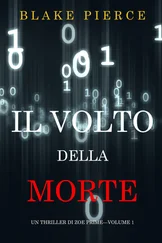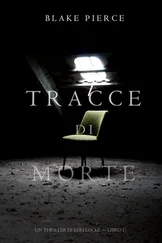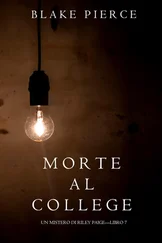The Bishop put up his hand in a mild sort of way, and Father Urban was rather glad that he did, for the atmosphere wasn’t right for the question. “I was asking somebody the other day how you liked parish work, Father.”
“Well,” said Father Urban, talking and smiling at the same time, “I hope whoever it was told you the truth. I must say I like it.” Was it possible that he wouldn’t have to ask the question?
“A little out of your line, isn’t it?”
“As you know, Your Excellency, we’re primarily a teaching and preaching order. Me, I’ve always been in the preaching end — for many years traveling out of Chicago, which I guess I still think of as home.” Didn’t the Bishop feel the same way? There was no indication that he did. “But the truth is we have parishes here and there throughout the country. One in Chicago. So parish work really isn’t out of our line — or even out of my line.”
The Bishop smiled. “Oh, I’ve heard good things about you, Father, since you’ve been at St Monica’s. I understand you’ve done more than hold the line.”
“Oh, I didn’t mean that.” Father Urban didn’t doubt that the Bishop had heard of his work at St Monica’s. “I only meant I go where I’m sent — and do the best I can.”
There was a knock at the door. Father Udovic, the Chancellor, looked in on them. Father Udovic, who was short and blond, wore what were almost cowboy heels. He said something about a long-distance call and withdrew.
“Father Udovic’s from Chicago,” said the Bishop.
And aren’t you? Father Urban wished to say, but didn’t dare, since the Bishop’s idea seemed to be that Father Urban could be from Chicago with Father Udovic but not with him. That was the impression that Father Urban got anyway, and he didn’t like it.
The Bishop rose from his desk. “The reason I asked”—asked what ? — “and I know it’s not for you to say, Father.” The Bishop was walking over to the wall where there was a large map of the diocese.
Father Urban got up and followed him.
“We have these parishes up here, three of them. Actually, they’re only missions — Indian missions.”
Father Urban looked at the spot where the Bishop’s finger had touched the map, at the blue water and hen tracks, these indicating bogs. This, then, was the answer to Father Urban’s unasked question, and doubtless the Bishop was congratulating himself on his handling of it.
“One man, with a good car, could take care of all three of ’em,” the Bishop said, going back to his desk but not sitting down — a needless precaution.
Father Urban had no desire to continue the interview. “Well, of course, it’s not for me to say,” he said, moving over to the table where he’d left his hat.
“I realize that, Father.”
“If you’d like me to mention it to Father Wilfrid, I will. Of course, he’d have to refer the matter to Chicago.”
“Do what you think best, Father. Now — to answer your question about this agitation for a new church at St Monica’s — the new man, whoever he is, will be the one to deal with that. And, by the way, I’m sorry I couldn’t make it to your talk the other night. Maybe next time.”
The Bishop had said no, but the word must have gone out, “Buy Clementine,” for suddenly, in the middle of Lent, retreatants descended upon the Hill like manna from heaven. Tools were put away and paint-can lids were tapped down hard. Wilf and Jack preached and preached, and Brother Harold performed greater miracles in the kitchen. Father Urban tightened his schedule at St Monica’s and drove over to the Hill oftener, since it was Wilf’s desire to give each group of retreatants at least one taste of the best wine the Clementines could serve. Wilf didn’t say that, of course, and Father Urban, who had long since stopped looking to his superiors for gratitude, would have been very much surprised if he had.
Wilf attributed the great change in their fortunes primarily to the brochure. It was doing the job he’d always known it would do. Next in importance, in his estimation, was the clever covering letter he’d written to pastors, a letter in which he thanked them for their “continued support.” And after that came the warmer weather and the fact that he’d had the furnace and ducts vacuum-cleaned. (“Found an old overshoe in your duct, Urban — no wonder you were cold.”) Thus Wilf accounted for the great change — and began negotiations with his discount house to procure “government surplus” beds and mattresses for Minor. “We’re on the move, boys.”
If so, why — why now?
They had come into the diocese cold, with no fifth column to soften up the population (no old grads around to say, “I went to school with the Clems”), with nothing but the Bishop’s permission to sustain them. The lower clergy, after welcoming them with all the lukewarmness at their command, had closed ranks and hardened at the prospect of being regarded by their own flocks as less traveled, less learned, and less spiritual than the newcomers. This is almost inevitable if the newcomers have a country place and wear a striking habit (which, unfortunately, the Clementines didn’t), and the secular clergy know it. They know that among them there are too many men whom too many people remember as something else, as, in Johnny Chumley’s case, a hockey player. In short, they know that they suffer from a deficiency of mystery and romance, as the Protestant clergy do, compared with them. But what they’d feared hadn’t happened in this instance. Wilf had made nothing of the one advantage he’d had. The Clementines, competitors not so much for the alms and stipends of the faithful as for their hearts, had got nowhere until Father Urban entered the lists. He, unlike Wilf, had taken good care to conquer the profane world before tackling the other one, and, for that reason, was able to deal with the clergy from a sitting, rather than a kneeling, position. They loved a winner. It was as simple as that. That was what was really behind the great change.
Father Urban, however, still wouldn’t call it success. They were getting the retreatants, yes, but they weren’t getting the revenue. The common practice — the retreatant to leave behind an offering to cover his board and room, and, if he wished, a bit more — just wasn’t working out at the Hill.
One afternoon, after a group of retreatants had departed, Father Urban walked into the office and found Wilf holding his head. “The take’s still off, eh?”
“It’s not quite what it should be,” Wilf said.
Father Urban scrutinized the roster of departed retreatants, sighed, and said what he’d refrained from saying before. “Too many Teutonic and Central European strains, I’m afraid, and these not the best of their kind.”
“Aw, now,” said Wilf. He was inclined to be touchy on this point. He held that it was only an historical accident that the American hierarchy was so Irish in its make-up. Father Urban, on the other hand, held that the Irish, ecclesiastically speaking, were the master race, and had had the saints, and still had the bishops, to prove it.
“No,” said Father Urban. “Let’s face it. We’re getting the ham-and-sausage-supper types now. The horseshoe pitchers. That’s all there is to it. They’re the ones who’re setting the tone, and it’s all wrong.”
“Maybe we shouldn’t look at it that way,” Wilf said. “So materially, I mean.”
“Try that on your grocer.”
“It is sort of discouraging.” Wilf said that he’d thought of putting up small signs such as hotels had in their bedrooms, but not setting a minimum rate, just suggesting one.
“No good.”
“No, I don’t like it much myself.”
Читать дальше
